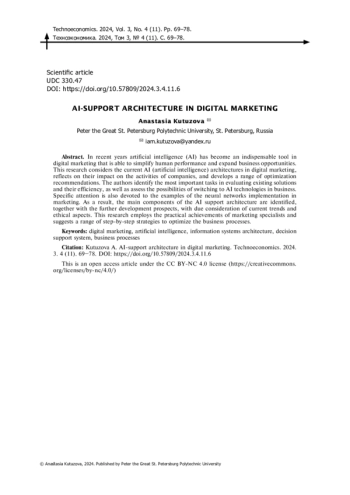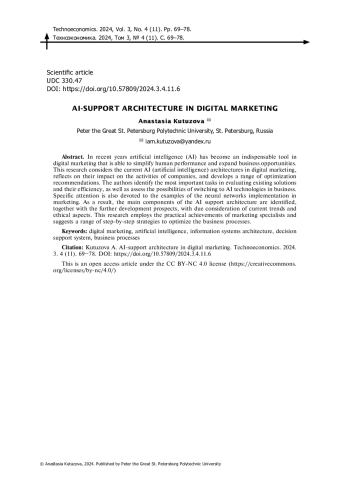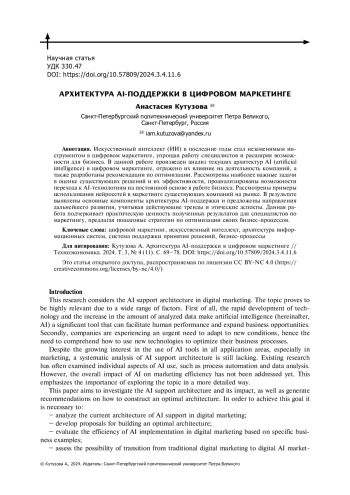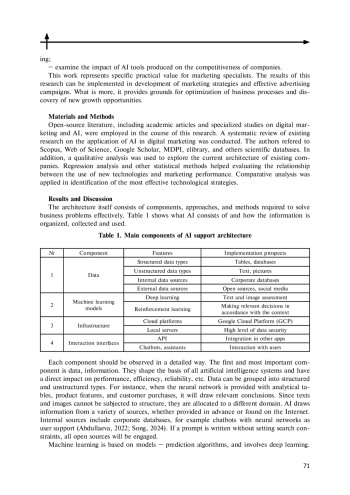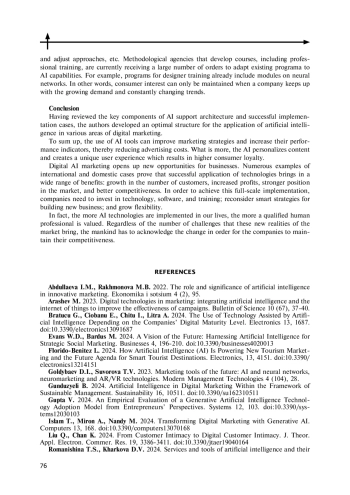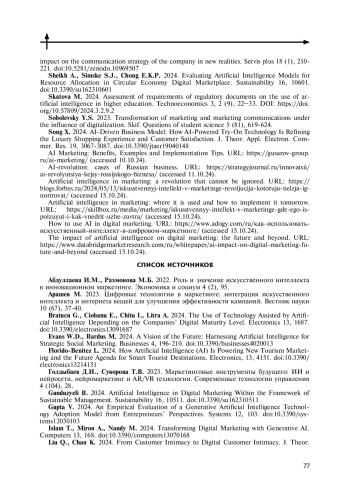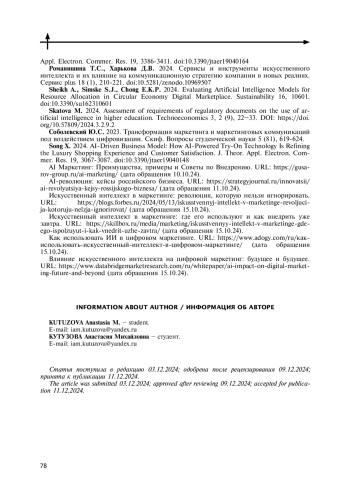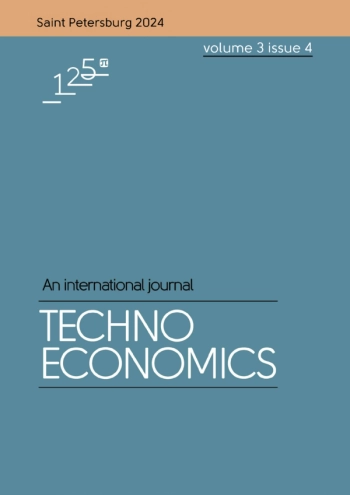In recent years artificial intelligence (AI) has become an indispensable tool in digital marketing that is able to simplify human performance and expand business opportunities. This research considers the current AI (artificial intelligence) architectures in digital marketing, reflects on their impact on the activities of companies, and develops a range of optimization recommendations. The authors identify the most important tasks in evaluating existing solutions and their efficiency, as well as assess the possibilities of switching to AI technologies in business. Specific attention is also devoted to the examples of the neural networks implementation in marketing. As a result, the main components of the AI support architecture are identified, together with the further development prospects, with due consideration of current trends and ethical aspects. This research employs the practical achievements of marketing specialists and suggests a range of step-by-step strategies to optimize the business processes.
Идентификаторы и классификаторы
This research considers the AI support architecture in digital marketing. The topic proves to be highly relevant due to a wide range of factors. First of all, the rapid development of technology and the increase in the amount of analyzed data make artificial intelligence (hereinafter, AI) a significant tool that can facilitate human performance and expand business opportunities. Secondly, companies are experiencing an urgent need to adapt to new conditions, hence the need to comprehend how to use new technologies to optimize their business processes.
Список литературы
1. Abdullaeva I.M., Rakhmonova M.B. 2022. The role and significance of artificial intelligence in innovative marketing. Ekonomika i sotsium 4 (2), 95. EDN: MQNHGS
2. Arashev M. 2023. Digital technologies in marketing: integrating artificial intelligence and the internet of things to improve the effectiveness of campaigns. Bulletin of Science 10 (67), 37-40.
3. Bratucu G., Ciobanu E., Chitu I., Litra A. 2024. The Use of Technology Assisted by Artificial Intelligence Depending on the Companies’ Digital Maturity Level. Electronics 13, 1687. DOI: 10.3390/electronics13091687
4. Evans W.D., Bardus M. 2024. A Vision of the Future: Harnessing Artificial Intelligence for Strategic Social Marketing. Businesses 4, 196-210. DOI: 10.3390/businesses4020013 EDN: NAVDYH
5. Florido-Benitez L. 2024. How Artificial Intelligence (AI) Is Powering New Tourism Marketing and the Future Agenda for Smart Tourist Destinations. Electronics, 13, 4151. 10.3390/ electronics13214151. DOI: 10.3390/electronics13214151
6. Goldybaev D.I., Suvorova T.V. 2023. Marketing tools of the future: AI and neural networks, neuromarketing and AR/VR technologies. Modern Management Technologies 4 (104), 28. EDN: TSCETG
7. Gunduzyeli B. 2024. Artificial Intelligence in Digital Marketing Within the Framework of Sustainable Management. Sustainability 16, 10511. DOI: 10.3390/su162310511
8. Gupta V. 2024. An Empirical Evaluation of a Generative Artificial Intelligence Technology Adoption Model from Entrepreneurs’ Perspectives. Systems 12, 103. DOI: 10.3390/sys-tems12030103 EDN: JZUFST
9. Islam T., Miron A., Nandy M. 2024. Transforming Digital Marketing with Generative AI.Computers 13, 168. DOI: 10.3390/computers13070168 EDN: TKLFBB
10. Liu Q., Chan K. 2024. From Customer Intimacy to Digital Customer Intimacy. J. Theor. Appl. Electron.Commer. Res. 19, 3386-3411. DOI: 10.3390/jtaer19040164 EDN: YTVXSO
11. Romanishina T.S., Kharkova D.V. 2024. Services and tools of artificial intelligence and their impact on the communication strategy of the company in new realities. Servis plus 18 (1), 210221. DOI: 10.5281/zenodo.10969507 EDN: EPZFCX
12. Sheikh A., Simske S.J., Chong E.K.P. 2024. Evaluating Artificial Intelligence Models for Resource Allocation in Circular Economy Digital Marketplace. Sustainability 16, 10601. DOI: 10.3390/su162310601 EDN: KKOUTZ
13. Skatova M. 2024. Assessment of requirements of regulatory documents on the use of artificial intelligence in higher education. Technoeconomics 3, 2 (9), 22-33. DOI: 10.57809/2024.3.2.9.2
14. Sobolevsky Y.S. 2023. Transformation of marketing and marketing communications under the influence of digitalization. Skif. Questions of student science 5 (81), 619-624.
15. Song X. 2024. AI-Driven Business Model: How AI-Powered Try-On Technology Is Refining the Luxury Shopping Experience and Customer Satisfaction. J. Theor. Appl. Electron.Commer. Res. 19, 3067-3087. DOI: 10.3390/jtaer19040148 EDN: BGTDQB
16. AI Marketing: Benefits, Examples and Implementation Tips. URL: https://gusarov-group.ru/ai-marketing/(accessed 10.10.24).
17. AI-revolution: cases of Russian business. URL: https://strategyjournal.ru/innovatsii/ ai-revolyutsiya-kejsy-rossijskogo-biznesa/(accessed 11.10.24).
18. Artificial intelligence in marketing: a revolution that cannot be ignored. URL: https://skillboxforbes.ru/2024/05/13/iskusstvennyj-intellekt-v-marketinge-revoljucija-kotoruju-nelzja-ig-norirovat/(accessed 15.10.24).
19. Artificial intelligence in marketing: where it is used and how to implement it tomorrow. URL: https://skillbox.ru/media/marketing/iskusstvennyy-intellekt-v-marketinge-gde-ego-ispolzuyut-i-kak-vnedrit-uzhe-zavtra/(accessed 15.10.24).
20. How to use AI in digital marketing. URL: https://www.adogy.com/ru/как-использовать-искусственный-интеллект-в-цифровом-маркетинге/(accessed 15.10.24).
21. The impact of artificial intelligence on digital marketing: the future and beyond. URL: https://www.databridgemarketresearch.com/ru/whitepaper/ai-impact-on-digital-marketing-fu-ture-and-beyond (accessed 15.10.24).
Выпуск
Другие статьи выпуска
This article discusses the relevance of mapping as a lean technology employed in the higher education institution in the conditions of digital transformation. The authors emphasize that modern challenges require optimization of business processes, which can be achieved by using lean production methods. In the course of the research a mapping tool was used to analyze and optimize the tracking of student attendance in the structural divisions of the university. This work aims to improve control over student attendance, including several major tasks: assessment of existing lean production tools, application of mapping in attendance tracking, optimization of the current control measures, and development of recommendations for further improvement based on the PDCA cycle. According to the results, mapping and the PDCA cycle proved their efficiency in terms of improving the quality of education in the digital environment.
This research focuses on summarizing statistical data on the total number of students enrolled in Bachelor, Specialist, and Master programs from 2005 to 2021. As a result, a general decrease in the number of students is determined. This trend can be associated with such factors as changes in demography, society, economy, and educational policies. The authors suggest introducing lean technologies into the learning process as a means to increase the number of people involved in education. The evident recent stabilization indicates possible changes in education, highlighting the importance of further research. The integration of lean practices in higher education not only responds to current challenges but also creates conditions for sustainable development of the educational system in the long run.
This research focuses on summarizing statistical data on the total number of students enrolled in Bachelor, Specialist, and Master programs from 2005 to 2021. As a result, a general decrease in the number of students is determined. This trend can be associated with such factors as changes in demography, society, economy, and educational policies. The authors suggest introducing lean technologies into the learning process as a means to increase the number of people involved in education. The evident recent stabilization indicates possible changes in education, highlighting the importance of further research. The integration of lean practices in higher education not only responds to current challenges but also creates conditions for sustainable development of the educational system in the long run.
Recent geopolitical disagreements have caused tectonic changes in economic, technological and scientific ties between the North-South countries. Russia, as a country with the largest territory and substantial natural resources, found itself at the epicenter of these changes. Numerous sanctions adopted by the collective West after February 2022 created a new geopolitical reality, when Russia can rely only on its own intellectual and technological resources. In such external conditions, Russia will most likely be guided only by its national interests, with the climate agenda playing a secondary role. This research examines a conceptual model of transport mobility, when not the climate agenda, but technological development becomes the main dominant of development. The basis of such transport mobility is the existence of critical technologies and new economic mechanisms for their implementation. In this paper the possible implementation of such a new model is presented, in particular, on the basis of national-scale projects to create a country’s own technological base in the field of electric vehicle (EV) manufacturing, hydrogen fuel cell locomotives, and modern shipbuilding.
This article examines the implementation of chatbots in healthcare as a means to automate the patient flow management. The authors analyze the current state of this process, identify operational bottlenecks, and propose chatbot-based solutions for automation of patient registration, document processing, and room allocation. The research method rests on modelling using chatbot technologies and evaluating their overall impact on healthcare efficiency and service delivery. According to the results, the introduction of chatbots reduces administrative workload, facilitates paperwork, and significantly improves service quality. Specific attention is paid to the risks associated with chatbot implementation, such as privacy concerns, and strategies for their mitigation. As a result, the introduction of chatbots proved to have a significant positive impact on operational efficiency, resource optimization, and patient satisfaction in healthcare.
The healthcare industry makes one of the main components of the productive forces of the state. Therefore, the well-being and welfare of the entire society in the future depend on its thriving development. Despite significant accumulated knowledge in medicine, there are still some white spots that are difficult to analyze and predict. The use of artificial intelligence and neural networks in healthcare can significantly expand the analytical apparatus and radically change the existing approaches to scientific research. This article discusses the results of the practical application of artificial intelligence and artificial neural networks in healthcare. The research aims to demonstrate the prospects and advantages of using these information technologies in medicine; identify problems in the implementation of AI technologies in medical practice and offer possible solutions to some of them. The authors provide a comprehensive literature review on the issues of artificial intelligence and neural networks, consider successful examples of the AI use in pharmacology, forecasting, and research of various types of diseases, including cardiovascular system, dermatology, and oncology. A significant part of the research is devoted to ethical and legal concerns, as well as problems associated with the practical use of artificial intelligence. As a result of the research, the authors suggest the models of the IT architecture of a medical information system and data flows, based on the TOGAF standard.
This article discusses the possibility of predicting the values of a series using complex-valued autoregression with an error for short-term forecasting. The authors consider the basic concepts of the function of a complex-valued variable and the model of complexvalued autoregression, together with the results of applying first- and second-order models of complex-valued autoregression with the CARE(p) error to describe and predict the initial series. The results obtained are compared with the first- and second-order autoregression in real numbers. A complex-valued autoregression model with an error showed a more accurate result for short-term forecasting, unlike the autoregression model in real numbers. The authors also conclude that complex-valued autoregression with an error is subject to further investigation in order to find out the prospects of using its imaginary part.
The Russian economy is highly import-dependent, which is also relevant for the enterprises of the science-intensive industry. The later is based on the emerging realities, and strives to develop and introduce a strategy that would allow for the most efficient implementation of the planned import substitution program. In this research the authors have developed a comprehensive mathematical model that takes into account the peculiarities of the local labour and technical capital market, as well as their impact on the production costs of the sciencebased enterprise. The practical application of indicators that can define the current state and the level of dependence of science-based production on foreign raw materials will provide grounds for a revision of the existing development strategy. What is more, it will be possible to take into due consideration the mission of import substitution, based on the available resources of the enterprise and the maximum permissible share of imports in production.
Статистика статьи
Статистика просмотров за 2025 год.
Издательство
- Издательство
- Политех
- Регион
- Россия, Санкт-Петербург
- Почтовый адрес
- 195251, г.Санкт-Петербург, ул. Политехническая, дом 29
- Юр. адрес
- 195251, г Санкт-Петербург, Калининский р-н, ул Политехническая, д 29 литера б
- ФИО
- Рудской Андрей Иванович (РЕКТОР)
- E-mail адрес
- office@spbstu.ru
- Контактный телефон
- +7 (812) 2972077
- Сайт
- https://spbstu.ru
